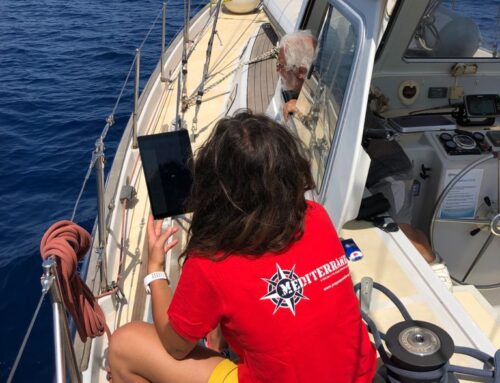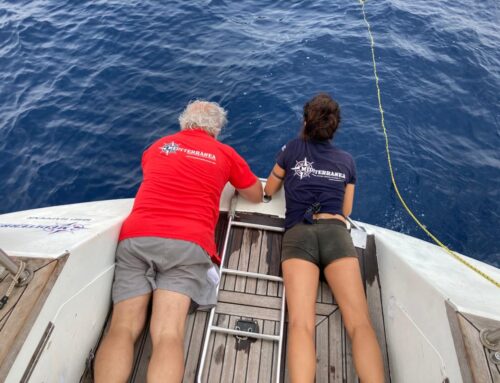
(by Simone Perotti)
Petros Markaris was born in Istanbul from a family of Armenian origin whose chosen language was that of the pilgrims, and thus linguistically, Greek; he studied in Germany, but later came to live in Athens, where we meet at the Italian Institute of Culture at Via Patission number 47. “The only place I can live is where my language is,” he says in his beautiful paper “Kostas Charitos and Me”.
His police inspector has become famous, and his books are translated in many parts of the world, in Italy by Bompiani; his last book has already been translated, and its title, which is not yet known, should be “Credit Titles”, at least according to the translation given to us by Markaris. They improperly call his character “the Greek Montalbano”, but Markaris says he was inspired above all by Sciascia and Vasquez Montalban. He is one of the very few writers who has decided to write about the recession, which plays a leading role in his books, all of which are set in a suffocatingly hot Athens, which is experiencing social tensions, moral degradation and the economic meltdown.
“Crime novels come directly from the social novel. Think of Les Misèrables, for example. Only that in detective and traditional crime novels, the question is “who?”, while in this case the question is “why?”.
Markaris goes straight into the first question: what are intellectuals doing to understand the recession and indicate the way. “When I speak to my colleagues we always discuss today’s problems. But then there is no trace of these problems in their books … I want to, and must, help people to understand today’s problems”.
The intellectual world is always ready to point a finger in these cases: “How can one understand today? You are too close! It is too early!”. “Which is quite true,” says the writer “but I have two things in my favour: I was born from a minority, so I have always been in a condition, let’s say, of difficulty, I’m used to it. In addition to that, I studied Brecht, who in speaking of a viewpoint, claims that one should draw it away from the object, placing it outside the scene, to better understand it. And what’s more I feel this responsibility: people must question themselves, they must try to understand”.
Markaris is someone who talks a great deal, and willingly, he seems to love communications. “Young people are convinced that mother Europe will save them. If you say anything different, they fly into a panic” he says, with a bitter but compassionate laugh. “I must also say that the flow of young people leaving the country to go abroad in the search of an easier fortune seems to have slowed down. After 2012, I see that some young people have decided to remain and fight here, for and in their Country”.
“My generation is by no means blameless, we have much to answer for. Today our duty is to help young people take that first, and most difficult, step towards a better future. That takes time, though. The greatest responsibility of the political class is that they minimised the extent of the problem, and people fell into the trap, unawares”.
It is almost unnecessary to put questions to Petros Markaris, who follows an interesting political, sociological and intellectual thread. “My generation personified politics, wet lived with politics in our pockets. Europe, on the other hand, was created on an economic basis, it speaks only a language of economy, and politics has become a nothing more than a willing handmaid, a tool for finance, which is moreover global, and not simply continental. People fell into the trap, an authentic advertising trap. Products instead of ideas were passed off on people, and people fell for it. Do you see what the trouble is?!”
Markaris is ablaze with indignation, you can tell that he’s lived his 77 years with dedication and participation. I ask him if we are not facing a cultural attach from the Northern countries and how the Mediterranean fits into all this. “When I travel to Germany I ask the Germans I meet what they think of Sicily, the Cyclades, and they go into raptures: beautiful they say, marvellous, we were there this summer! Well, I answer them, what a pity that you nothing at all about those places! The Mediterranean is not an island for your holidays, but a place with an identity! But it doesn’t surprise me. Germans know nothing about politics, they are completely ignorant about politics. They know everything about industry, marketing, products, organisation, they have many other qualities, but they know nothing at all about politics”.
From the heights of his incredible learning, Markaris enjoys making fun, just a little, of such distant and different countries. I ask him what he thinks of the view whereby each invader needs to have someone who is prepared to be invaded. “That’s absolutely true. I don’t know why, but at a certain point we started looking north. We stopped asking ourselves and understanding how to live together in the South. Actually, I do know why: it is a question of education and culture. When we stopped investing in these things we became that someone who was prepared to be invaded. That’s what happens when you talk constantly about money, and never about anything else”.
Money. The economy … continues Markaris: “The turning point was the cold war. Too much money along the Eastern border. Money that served to hold the position against the soviet socialist block. With each step we took towards the EU, which originated as a market, then became a currency, and later an economic community, we lost bits of our ability to produce culture, ideas. and thus, real and useful politics”.
And now we are paying the price, aren’t we? “Obviously. We are paying the price for our lack of ideas. In other words, we are also, and above all, to blame for this recession. But we should be careful, things can get worse. The system as it is today, just cannot last. Sooner or later it will collapse. Zero growth and no vision. A gloomy outlook. The system has reached the end of the line, and someone is going to have to take the initiative”. I ask him if he has someone in mind, but Markaris shakes his head. He doesn’t have an answer. Does anyone have any ideas?
I try asking him about the question of method, which is always useful, when you run out of ideas. Perhaps we reasoned far too much on the elements of proximity between the countries and cultures of the Mediterranean. Perhaps we should invert the sign, and imagine an exercise book filled with the differences. What does Markaris think of this?
“An excellent suggestion. We need to make out a catalogue of the differences, viewpoints, and then try to trace our identities, decide what our proprieties are, how we see life and the community every day”.
It is certainly not a simple matter, so I try a little pessimism, this time. Is there no lucidity, no motivation …? What do we need to start this process? “The people of the Mediterranean have a very dangerous failing: we have a real passion for simple answers, that do not exist”.
I try mentioning the idea of the United States of the Mediterranean. Well all is said and done, people started talking about a United Europe two hundred years ago, and that seemed to be a sort of utopia at the time…
“Very few people speak of the Mediterranean, far too few. The idea sounds good, but you need to decide where to start. Starting from Europe, the economy, has failed. Capitalism allowed itself to be manipulated by the world of finance and an uncontrolled economy, and this was the result of the failure of socialism. What kind of system do we now want to create, and how do we want to live? There is no intellectual back-up, above all, not from the left-wing!”
Markaris is by now almost reciting a litany and ends our interview with an accusation, that I cannot challenge or comment, because I agree with everything he is saying: “The left-wing party?! Where is the left-wing party? I am a left-winger! The problem is that the left-wing party no longer exists! Who are left-wing politicians today: Syriza? Renzi? Please…. … Sorry, I don’t want to offend anyone, but you can’t tell me that Renzi is a left-wing politician! And Syriza? That’s not a left-wing party, it’s a party that has attracted all those disillusioned consumers. There are no intellectuals in that party, there is no planning. In their programme, culture covers half a page. You’re joking, right?! The fact is that to have a left-wing party, you need ideas, intellectuals, and the left-wing party no longer has any”.
After switching off the camera, Markaris doesn’t want to leave us with the idea that everything he says is negative. “Let me make it quite clear, I agree with that Frenchman who said that optimism is only a lack of information. I am therefore not an ideological optimist. But I am always ready to fight, to commit myself, when the battle is truly on”.
What spirit, Petros Markaris.





Leave A Comment